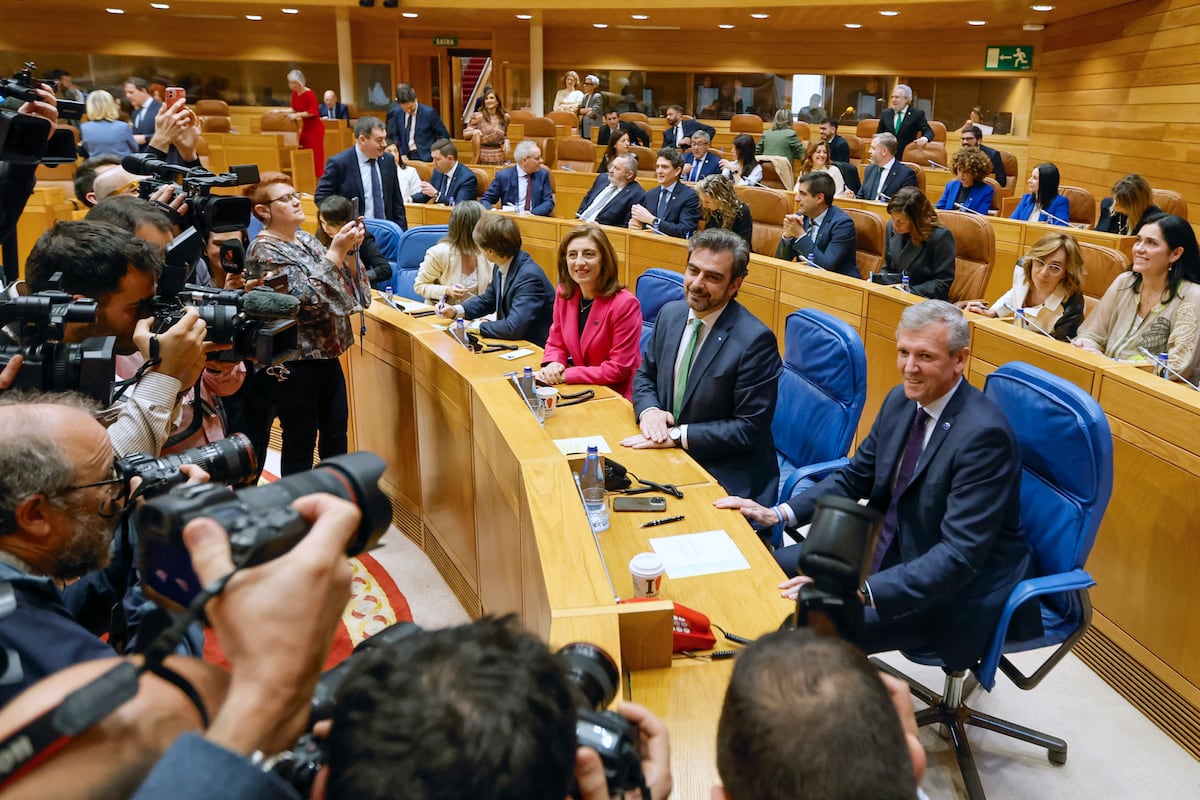The review of the regional financing system, one of the great structural reforms that Spain is dragging, will continue to stall and will be delayed until the end of the electoral cycle of this legislature, which will have its culmination in the general elections at the end of next year or the beginning of 2024 The current model, which practically does not satisfy any autonomous baron, should have been renewed a decade ago, in 2014, but in the Government, the PSOE and the PP assume that it will be unfeasible to renovate it now.
Nothing helps.
A cycle riddled with elections begins, the matter is very complex and faces conflicting claims outside the ideological.
As if that were not enough, the PP opens leadership with Alberto Núñez Feijóo, who as president of Galicia had a party position and for whom now resolving this issue is not the highest priority either.
The sources consulted in the Government and the two major parties agree that only a great pact between Ferraz and Genoa would make it possible to renew the financing of the autonomies after successive postponements due to political instability, the pandemic and now the economic and social crisis for the war in Ukraine.
But in this matter neither socialists nor popular –between them they preside over all the communities except Catalonia, Euskadi and Cantabria– have managed to establish a unique position as a party.
The barons consulted have made up their minds that the financing system will remain unchanged in the short term.
One of the best examples of the complexity of some diabolical negotiations is that until now Feijóo had championed as president of Galicia the so-called G-8, the block of the oldest and most depopulated communities governed by the PP and the PSOE, which ask to change the distribution criteria against those who want the number of inhabitants to prevail.
Among these was Andalucía, of Juan Manuel Moreno, the great stronghold and partner in the PP of Feijóo, who has placed his adviser, Juan Bravo, in his team in Genoa as Deputy Secretary of Economy, a defender of taking the population criterion more into account. for the distribution of public money.
And he is not the only one in the PP: in a similar position is the president of Murcia, Fernando López Miras.
In the environment of Feijóo they explain that now the matter is indeed complicated, with contradictory interests in the parties themselves, but they indicate that it should be the Government of Pedro Sánchez that takes a step forward and does not give up at least starting the debate on the new model to advance the discussion somewhat, even if it had to be postponed for the next legislature.
Feijóo's PP does not want to assume the burden or the responsibility of being the one to postpone this issue again, according to official sources.
In the Ministry of Finance they insist in turn that they do not give up closing a new financing model before the end of the legislature, although they recognize that it is very complicated.
The peculiar political situation in the country makes it once again difficult to reach an agreement given the imminence of the Andalusian elections, which according to all indications will be held in June or at the latest in autumn and will be the prelude to the regional and municipal elections in May 2023. That is, when the socialists and popular will risk almost all their territorial power.
The differences between the communities of the PSOE or those of the PP on the criteria that should prevail in the future financing system based on demographic and geographical factors are one of the key factors that makes a consensus practically impossible.
The dependence, in turn, of the partners in the coalition governments further complicates the achievement of an agreement.
The PP, in that sense, has it somewhat easier,
since it only shares the Junta de Andalucía with Ciudadanos.
The PSOE, on the other hand, governs with very diverse partners that range from United We Can to left-wing nationalist parties and conservative regionalists.
“Since the Ministry of Finance presented its adjusted population proposal, nobody has moved from their positions.
Neither the presidents of the PSOE nor those of the PP”, summarize government sources.
The new Deputy Secretary of Economy of the PP assumed in February in the Andalusian Parliament, before the document presented by the Government in December with the new criterion of the adjusted population, that the system could not be reviewed in 2022. It would have to be postponed until at least 2023 Bravo proposed that, meanwhile, all the parties could agree on the creation of a "transitional fund" to financially compensate the autonomies until this mess is resolved.
He did not achieve much consensus.
The discussion abounded in the historical idea that is handled from Andalusia, and other communities, that the central Executive underfinances them between 10,400 and 17,000 million and in the variety of criteria to be taken into account.
A symptom of how far away a solution seems is that the financing of the autonomies did not come out either in the three hours of the meeting that Pedro Sánchez and Feijóo held on April 7 in La Moncloa.
The President of the Government did not even include it among the 11 State proposals in which he considered it possible to agree with the PP, with his priority in renewing institutional positions, the Council of the Judicial Power or the Constitutional Court.
Feijóo will not include regional financing in the alternative document that he will present this Tuesday to the social agents in Genoa and will deliver to the Government on Friday, and where he focuses on requiring lower taxes and "temporary and exceptional" touch-ups in personal income tax while this crisis lasts of the Ukrainian war.
The still president of the Xunta, who in this matter maintains a position contrary to the president of Madrid, Isabel Díaz Ayuso, did not urge to reform the financing system in the tour of Spain that he carried out before his election in the extraordinary congress of the PP in Seville from April 1 and 2.
He was also not mentioned in the conclave in which the succession of Pablo Casado was consummated.
However, several popular barons complained three weeks earlier about the lack of news at the conference of presidents in La Palma.
“We request that the Fiscal and Financial Policy Council be convened – this body brings together the Treasury advisers and the ministry – and we begin to debate the model.
We have an outdated, old system that is leading us to a situation of suffocation.
We do not understand why a problem of the autonomous communities in which Andalusia loses 1,000 million a year, 4 million a day, is given up, "said Moreno.
"Unfortunately, expectations are low, if this is not a state issue, I don't know what could be," added López Miras.
Faced with criticism from some barons who even demand new state funds, the Ministry of Finance recalls that the communities caressed in 2021 the first fiscal surplus in history.
The extraordinary transfers from the State, the resources of the financing system and the improvement in income allowed the autonomies to register a deficit of 334 million (0.03% of GDP).
The Treasury adds that the communities received 16,000 million in 2020 to be able to attend public services in the pandemic.
A similar injection occurred a year later (13.5 billion).
However, the communities did not spend almost 3,000 million, that is, around 10% of those transfers.
Ten autonomous regions closed the year with a surplus – Navarra (1.30% of GDP), the Balearic Islands (1.17%), Asturias and Cantabria (0.93% of GDP), the Basque Country (0.84%), the Canary Islands (0 .50%), Castilla-La Mancha (0.33%), Madrid (0.32%), Extremadura (0.20%) and La Rioja (0.03%)– and seven with red numbers: Murcia (1 .40%), the Valencian Community (1.15%), Catalonia (0.33%), Andalusia (0.19%), Galicia (0.16%), Aragon (0.15%) and Castilla y León (0.10%).
In absolute figures, the surplus was headed by Madrid with 735 million and the deficit was led by the Valencian Community, with a negative result of 1,292 million.
The community of Díaz Ayuso was the only one of the PP that closed with positive numbers.
Another element that all the barons, regardless of their party, are very aware of.
Exclusive content for subscribers
read without limits
subscribe
I'm already a subscriber

/cloudfront-eu-central-1.images.arcpublishing.com/prisa/OZRKJ7VBENGEFAJMPEFQPAUYOI.JPG)
/cloudfront-eu-central-1.images.arcpublishing.com/prisa/N5DD4I3GJ5GK5FTAMUNXKCCJWY.jpg)












